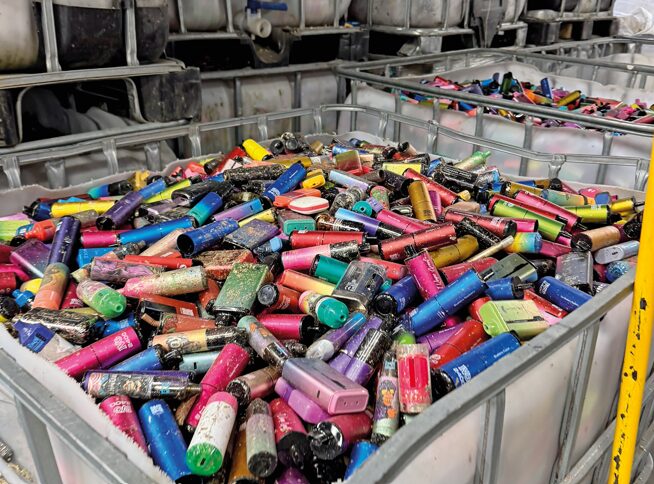Thousands of retailers are now at risk of breaking vape recycling laws, after Green Wings Project (GWP) halted its waste collections following government intervention.
Last month, partnered stores received communication from the charity announcing a restructure “guided by the Environmental Agency (EA)”. The communication, seen by Better Retailing, said: “This includes renegotiating agreements with our logistics partners and suppliers to create a more streamlined process that better serves the environment and our supporters. We are temporarily pausing the issuance of DPD return labels.”
The company added it was unable to offer alternative solutions for retailers. Under GWP’s scheme since 2023, retailers are provided with free disposable vape bins to help them comply with the Waste Electrical and Electronic Equipment (WEEE) regulation.
According to a 2023 Companies House report, GWP distributed 19,000 bins to more than 6,000 retail sites across the UK. GWP failed to clarify when its service would resume when asked by Better Retailing, while the EA stated it “cannot comment on individual companies”. The restructure puts the 3,000 retailers partnered with GWP at risk of breaking WEEE regulations unless they find an alternative partner.
Under WEEE, stores selling more than £1,923 in electronics, including vapes, must offer a service for customers to return used devices for recycling, with unlimited fines being the most-severe penalties for non-compliance.
Last month, the Office for Product Safety and Standards sent letters to noncompliant stores urging them follow the regulation. Store owners affected by GWP’s restructure expressed frustration over a lack of clarity on what to do with leftover vapes.
EXCLUSIVE: Government sends recycling warnings to local stores
Challenged on this by Better Retailing, GWP responded: “We are not restructuring our charity, but we are changing the way we collect and transport the depleted vapes. We recently moved our storage operation from a warehouse in London to a dedicated one in the Midlands, and the EA quite properly came to meet us there, by appointment, to observe that vapes were being held safely and securely.
“It was very satisfied by its inspection. During its visit, we had a convivial, professional and productive discussion about the processes we follow in collecting vapes and transporting them to our warehouse. During this discussion, it gave us guidance on the consignment note system we have employed. We take our responsibilities seriously and, following the guidelines of EA, we are currently updating our operational system to develop an improved, more efficient, compliant and sustainable service.”
Prior to the pause, retailers were being asked by the charity to email it with the weight of a bin’s contents once full. GWP then generated a DPD label and sent it to the retailer so that vapes could be posted to its warehouse.
Recycling experts told Better Retailing vape bins used commonly by small shops can store around 150 devices, depending on size. However, by doing so, retailers have been unknowingly breaching other regulations by sending used vapes through DPD. Businesses moving hazardous waste, which includes vapes, must provide a Hazardous Waste Consignment Note at the point of transfer. This outlines the contents of what is being delivered. Failure to do so could lead to prosecution for retailers.
Several partnered stores told Better Retailing they were not made aware of this obligation by GWP. The DPD return labels generated by GWP for retailers, seen by Better Retailing, also offered no option for the retailer to list the contents. One retailer, who asked not to be named, said: “I was sent a label to print out, but there was no paperwork to be filled out. If I’d known they were not doing things in the right way, I would never have got involved.”
DPD confirmed to Better Retailing it had paused its partnership with GWP, after discovering it had breached its contract by asking retailers to send used vapes through its UK network. The courier said: “We can confirm that Green Wings Project does have a contract with DPD to ship disposable vapes, which covers the specific materials involved while being shipped within the DPD network.
How to get your store ready for the disposable vape ban
“However, the contract does not currently cover the vapes being returned into shops. As a result, we have paused the account temporarily while we work with it to refine the service to ensure we continue to support it in a safe and compliant way.”
GWP claimed to have formal partnerships with several councils including Orkney Islands Council, London Borough of Hounslow, Cambridgeshire County Council, Enfield Borough Council and Eastleigh Borough Council. These councils denied any official partnership when asked by Better Retailing.
The company had also previously stated it was in talks to formally partner with DHL. However, the courier confirmed to Retail Express it has never had GWP as a customer. Stressing importance for retailers to be compliant with vape legislation, Scott Butler, executive director of Material Focus, said: “With the single-use vape ban due to start at the beginning of June, and with new vape products coming onto the market, it’s important that retailers work with reputable waste-management companies to comply with their takeback and recycling obligations.
“Material Focus has a briefing paper that provides information on how retailers can comply with vape and other electrical recycling regulations.” Advising on how retailers can find the right partner for WEEE, one senior recycling industry figure told Better Retailing: “One of the most overlooked factors when selecting a recycling partner is that your waste remains your legal responsibility until it has reached a fully compliant recycled outcome. “Always request their Duty of Care documentation. Beyond confirming basic requirements – such as whether they’re a licensed waste carrier, or have the necessary insurances – this document clarifies whether they act as an intermediary or a full-scale recycler.”
Read more Vape Retailer news



Comments
This article doesn't have any comments yet, be the first!